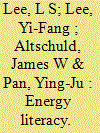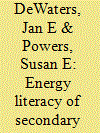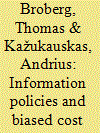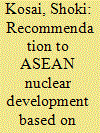|
|
|
Sort Order |
|
|
|
Items / Page
|
|
|
|
|
|
|
| Srl | Item |
| 1 |
ID:
137666


|
|
|
|
|
| Summary/Abstract |
Energy literacy that can empower people to make thoughtful decisions and take responsible actions is more important as energy shortages have become pressing issues in the world. Energy literacy was measured among a sample of 2400 secondary students involved in a national energy education program in Taiwan. Response patterns related to student background and factors determining energy consumption behaviors were also studied. Energy literacy was high and positive, with greater impact as expected by grade (senior high school students outscored junior high school ones) and there were some effects due to gender and socioeconomic status. Students' performance on energy knowledge was acceptable (over 60% correct across grades) while a notable discrepancy between affect and behavior was identified indicating that there might not be a correspondence between what people say they would do and what they actually do. Energy saving behavior was more closely associated with the affect than other variables. Reasons for the findings and implications for energy education in the future are discussed.
|
|
|
|
|
|
|
|
|
|
|
|
|
|
|
|
| 2 |
ID:
103473


|
|
|
|
|
| Publication |
2011.
|
| Summary/Abstract |
Energy literacy, which encompasses broad content knowledge as well as affective and behavioral characteristics, will empower people to make appropriate energy-related choices and embrace changes in the way we harness and consume energy. Energy literacy was measured with a written questionnaire completed by 3708 secondary students in New York State, USA. Results indicate that students are concerned about energy problems (affective subscale mean 73% of the maximum attainable score), yet relatively low cognitive (42% correct) and behavioral (65% of the maximum) scores suggest that students may lack the knowledge and skills they need to effectively contribute toward solutions. High school (HS) students scored significantly better than middle school (MS) students on the cognitive subscale; gains were greatest on topics included in NY State educational standards, and less on topics related to "practical" energy knowledge such as ways to save energy. Despite knowledge gains, there was a significant drop in energy conservation behavior between the MS and HS students. Intercorrelations between groups of questions indicate energy-related behaviors are more strongly related to affect than to knowledge. These findings underscore the need for education that improves energy literacy by impacting student attitudes, values and behaviors, as well as broad content knowledge.
|
|
|
|
|
|
|
|
|
|
|
|
|
|
|
|
| 3 |
ID:
186481


|
|
|
|
|
| Summary/Abstract |
Energy labels with compact information on the energy use of appliances have been adopted worldwide to encourage consumers to make informed investment decisions. This study examines whether communicating environmental emissions (CO2 and air pollutant emissions) on energy labels can increase the preferences for energy-efficient appliances, with a specific focus on the role of individual psychological traits. A survey with decision tasks was conducted among the adult population in the Netherlands. Results show that information on environmental emissions does not increase the intention to invest in energy-efficiency, while energy-saving attitudes and habits do. Nevertheless, presenting information on CO2 emissions as well as combined CO2 and air pollutant emissions on energy labels can increase the preferences for energy-efficient appliances among individuals with relatively strong postmaterialist values. Information on CO2 emissions also increases the preferences of individuals with strong environmental concerns. However, no significant effects are found for information on air pollutant emissions. Also, personal experience of environmental degradation was not found to affect the effectiveness of the tested information interventions. Finally, we discuss the role of attention and type of decision situation for the processing of emissions information on energy labels. Our findings provide insights for improving information display on energy labels and energy education.
|
|
|
|
|
|
|
|
|
|
|
|
|
|
|
|
| 4 |
ID:
177346


|
|
|
|
|
| Summary/Abstract |
Households typically receive utility bills where all electricity use during a fixed period is lumped together. The lack of direct feedback in the form of marginal costs of using specific electric appliances potentially leads to mistakes in households' decision-making because of biased cost perceptions. In this paper, we test the commonly held notion that lack of relevant energy-related knowledge results in cost underestimation of using electric appliances that may lead to over-consumption of energy. Contrary to this notion, our results show that less knowledgeable energy consumers tend to have higher cost perceptions than others. This finding implies that less knowledgeable energy consumers may consume too little of energy. We also find that a substantial share of the sampled households, in particular less knowledgeable energy consumers, are less willing to receive relevant cost-free information about their energy use and costs. This finding suggests that poor energy-related knowledge may not only be a matter of high information search and processing costs, but also a matter of consumers’ limited attention capacity.
|
|
|
|
|
|
|
|
|
|
|
|
|
|
|
|
| 5 |
ID:
166496


|
|
|
|
|
| Summary/Abstract |
The disastrous circumstances in the aftermath of a massive event like Fukushima nuclear accident is not unique to Japan. The more exertion to prevent the next Fukushima nuclear accident is required not to reiterate the similar failure. The countries where nuclear power is potentially introduced in future need to study the lessons learnt from the Fukushima nuclear accident, which would help to highlight the critical point for the future nuclear operation. However, the scholarly application of the lessons from the Fukushima nuclear accident to such countries, in particular ASEAN Member States (AMS), has yet to be fully discussed. As such, this study first conducts the diachronic analysis of various energy and nuclear policies in Japan before and after the Fukushima nuclear accident and then identifies the three major lessons and challenges, that is; nuclear regulatory institutional reform, development of stringent regulation and public engagement in policy making. Finally, the current nuclear situation in Indonesia, Malaysia, the Philippine and Thailand in ASEAN is analyzed to extract the critical aspect of nuclear installation in AMS and to provide strategic implications on the basis of the identified lessons learnt from the Fukushima nuclear accident.
|
|
|
|
|
|
|
|
|
|
|
|
|
|
|
|
| 6 |
ID:
169875


|
|
|
|
|
| Summary/Abstract |
Nurses' energy literacy should be developed during schooling to ensure their involvement in sustainable healthcare. In this study, we explored nursing students' energy literacy and the relationships among knowledge, affect, and behavior to understand their implications on energy conservation efforts in Taiwan. A revised Energy Literacy Questionnaire (ELQ) was administered to 1160 students in 13 nursing colleges in Taiwan. The descriptive analysis results revealed that 42.7% of the respondents answered more than half of the energy knowledge related questions correctly. They also indicated that the nursing students still heavily relied on their schools for acquisition of energy knowledge. The multiple regression analysis indicated that energy conservation behavior was closely and positively associated with energy affect in contrast to energy knowledge. Among all demographic factors, only economic status between the “well-off” and the “facing financial difficulty” groups was significant for the students’ energy conservation behavior. According to the results, related policy implications are further discussed.
|
|
|
|
|
|
|
|
|
|
|
|
|
|
|
|
|
|
|
|
|